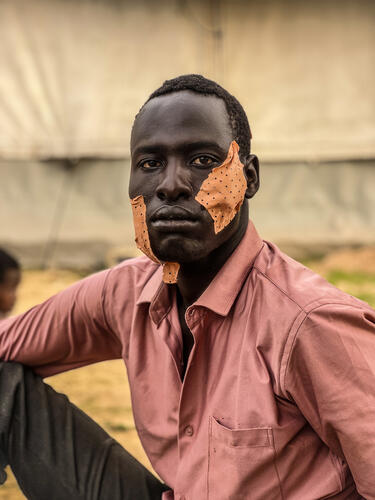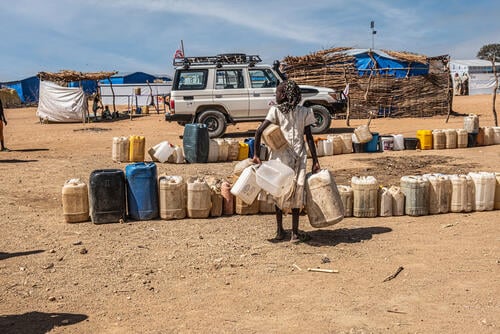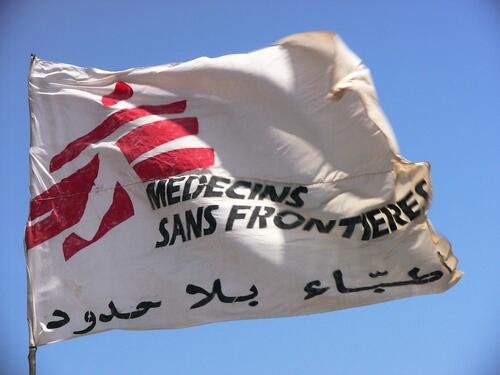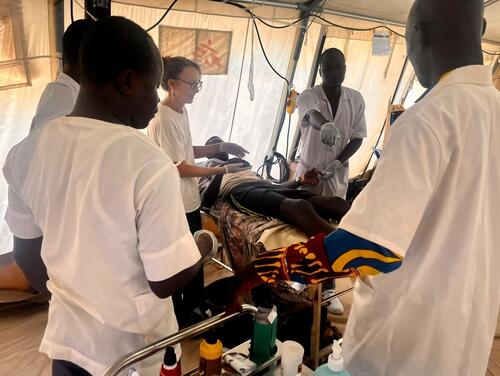Around 15,000 Sudanese refugees have fled West Darfur state, Sudan, and reached the Chadian town of Adré in the last four days. Many of the arrivals report seeing people shot and killed as they tried to escape West Darfur’s capital, El Geneina, says Médecins Sans Frontières (MSF).
MSF urges all armed groups in and around El Geneina to spare civilians and to let people who want to leave the area to do so unharmed.
After nearly two months of blockade and large-scale violence in El Geneina, located approximately 35 kilometres from the Chadian border, thousands of people are now desperately trying to escape the area.
Most people fled on foot heading northeast, but many were killed on this route. I can’t tell how many, but I saw many dead and wounded people lying on the ground.Nour, a 25-year-old from El Geneina who arrived at Adré hospital
“On Wednesday night, 14 June, the governor of West Darfur was killed,” says Nour, a 25-year-old from El Geneina who arrived at Adré hospital.
“At that moment, we knew that the situation would get even worse,” he says. “Most people fled on foot heading northeast, but many were killed on this route. I can’t tell how many, but I saw many dead and wounded people lying on the ground.
“People started walking to Adré in Chad, but the journey was full of dangers, as we were exposed and targeted. On Thursday, while I was walking near a town called Shukri, an armed man shot me in the face, but thank God I survived, and am being treated here in Adré hospital,” says Nour.

On Thursday, 15 June, Salma* and her two sisters were fleeing the chaos in El Geneina. Their escape was abruptly halted when six armed men on a bus wrenched away one of Salma’s sisters and raped her.
“They kept her for some time inside the bus, after they finished with her, they threw her out of the bus and left. My sister is only 15 years old,” says Salma.
Salma’s sister is currently fighting for her life in Adré hospital, where she is receiving critical medical support. The three sisters are not only facing the trauma of violence but also the anguish of being separated from their parents.
They came to the neighbourhood... fully armed with machine guns. They killed anyone they saw, and then went looting houses and burning the neighbourhood.Nour, a 25-year-old from El Geneina who arrived at Adré hospital
For almost two months, El Geneina has seen intense fighting, initially triggered by clashes that erupted on 15 April between the Sudanese Armed Forces (SAF) and the Rapid Support Forces (RSF) in Khartoum.
The unrest has since spiralled into chaos in El Geneina, with intercommunal violence involving youth groups from the Masalit and Arab tribes adding fuel to the fire.
“The level of violence has been escalating and people fear being targeted or exposed to violence,” says Konstantinos Psykakos, MSF’s outgoing project coordinator in Adré, Chad.
Eyewitness accounts from patients who have arrived in Adré hospital report mass killings, displacement, looting and dead bodies in the streets.
“No one was allowed to go in or out. We didn’t have clean water to drink, as the armed groups destroyed it. People tried to get clean water from some wadis or natural running water, but snipers were shooting at them,” says Nour.
“They came to the neighbourhood on pickups and motorbikes, fully armed with machine guns. They killed anyone they saw, and then went looting houses and burning the neighbourhood.”
Salima escaped El Geneina with her five daughters and two sons, after she was shot in the right leg, causing multiple fractures, while walking in the street. She has lost contact with her husband and doesn’t know where he is.
“I don’t want to go back home because the unthinkable is happening,” says Salima. “Men and boys are being killed, and sometimes the armed men let women flee and sometimes not.”
MSF continues to call all parties to the conflict in and around El Geneina to spare civilians and vital infrastructure, and to allow humanitarian teams to safely access the city to provide much-needed support for the wounded and sick.
*Name changed to protect identity.






